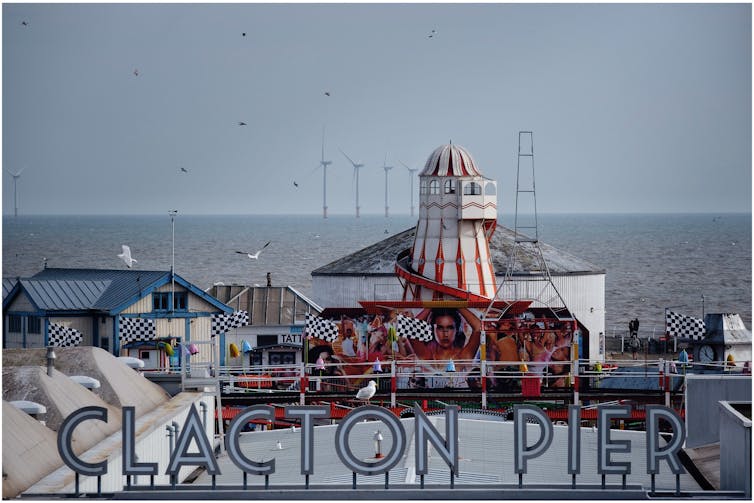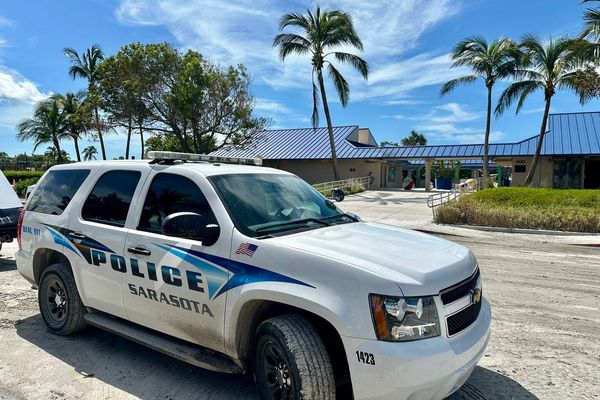Clacton used to be famous for something other than Nigel Farage. As well as its golden age as a seaside resort, back in the 1960s, it was a place to experience vibrant youth culture.
Radio Caroline, the pirate radio broadcaster was anchored offshore. Local residents would park up on the beach and flash their car lights at the ship. Local historian, Roger Kennell, even remembers boat trips to see Caroline, where “young people would toss song requests on deck”. It was something to be proud of on the north Essex coast.
Today, Farage, leader of Reform UK, has chosen Clacton in his eighth attempt to get elected to parliament. So-called “left behind” places are considered fertile ground for populist politics, and so Farage’s selection of Clacton is of little surprise. But populism does not offer a voice to the town. Instead it helps to silence the harsh experience of seaside decline, and cuts off avenues for people to articulate feelings of genuine pride in the places they live.
Farage is adeptly exploiting a disconnect between superficial perceptions of tourists visiting for an ice cream when the sun’s out and Clacton’s economic woes.
We’ve been conducting research on the heritage and emotional geography of the Clacton constituency, including Walton-on-the-Naze and Frinton-on-Sea. Rather than viewing the area in terms of deficit and decline, we need to explore how existing local pride can be more effectively shared in the community and with tourists.
Seaside decline
Clacton’s golden age started in the late 1800s. Hordes of London-based bathers arrived on pleasure steamers, mooring on the purpose-built pier. A Butlins holiday camp opened in 1938. By 1970, however, cheap holidays abroad badly affected seaside economies. Butlins closed in 1983, exacerbating Clacton’s decline.
Today, wages, employment, and life expectancy are low, and crime is high. The constituency is mostly white and markedly older than most places in Essex. Considerable socioeconomic disparities are evident across the constituency. There’s a remarkable £100,000 difference between property prices in Frinton, considered upmarket, and nearby Walton. Good rail links to London and a workforce employed by an expanding healthcare industry are influencing socioeconomic and cultural diversity.

The Conservative government has attempted to boost civic pride in recent years, but research into these policies exposed differences between rhetoric and reality. Proposals to recalibrate deep-rooted geographic inequality rely on crude contrasts between “left behind” places, bereft of pride, and “steaming ahead” places, registering high levels of satisfaction with heritage, culture, and environment. Researchers challenge the idea that feelings like pride can be quantifiably measured. Pride is haphazard, immeasurable and often invisible.
Hidden heritage
Our research into the constituency aimed to challenge stereotypical perceptions of the coastal towns of Tendring, the district where Clacton is situated.
Despite Butlins’ demise, we found Clacton’s image as a tourist destination still resonates with ordinary people. The offer of affordable seaside fun gives an important boost to the seasonal economy, but visitors increasingly perceive the town as lacking in the vibrancy of its past. For example, an exhibit in the local museum depicts a seaside town “unlikely to regain its former glory”. When surveyed, many tourists referred to it as a place to “revisit memories” rather than celebrate the future.
Compared to similar size towns in the UK, Clacton has a limited heritage and cultural offer. It has a wonderful but very small museum space run by active volunteers in the public library. There’s room for about five visitors at a time, and it’s open just twice a week. Sadly, other venues where Clacton’s hidden heritage was celebrated have shut, such as museum dedicated to Pirate Radio which closed in 2016.
Between 2018 and 2019, community groups came together to discuss neglected coastal heritage assets in the area. As in other Essex seaside towns, we found a rich seam of untapped heritage, culture, and art.
These included emotional ties to East London, recent coastal oral histories along Jaywick Sands, places of architectural note, and a vibrant, yet mostly underexposed, social history. Unlike conspicuous seaside attractions such as piers and arcades, hidden heritage brings a unique sense of community pride. There’s also a rich history of environmental concern dating back to publications on coastal erosion in the 1970s that relate to recent seaside initiatives to tackle plastic pollution.
Seaside futures
Yet, these sources of pride are often unrepresented and undervalued in seaside economies. Left-behind places are not lacking in pride, but they struggle to find venues to put that pride on display.
Our current research is looking at ways to develop a social history museum to help rectify this in the constituency. We’re starting to map places, stories and events people are proud of locally, using archives and participatory workshops with current residents. Local people are sharing personal archives, like postcards, sporting memories and alternative seaside stories.
To create meaningful venues that local people can take pride in, we need to reject current top-down government funding which forces communities to compete for grants. One idea we’ve put forward is a partnership between local community groups, authorities, universities, and social enterprises to get closer to realising, valuing, and responding to expressions of pride.
By standing in Clacton, Farage has certainly brought attention to the constituency, whether or not the local residents like it. But when the election is over, and whoever wins, the town needs support to help it express and celebrate its unique pride in place.
The authors do not work for, consult, own shares in or receive funding from any company or organisation that would benefit from this article, and have disclosed no relevant affiliations beyond their academic appointment.
This article was originally published on The Conversation. Read the original article.







